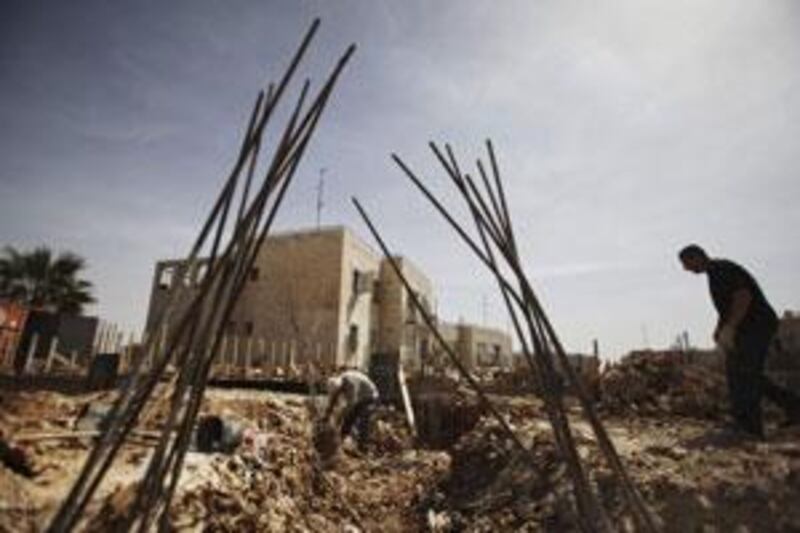RAMALLAH // Indirect peace talks between the Palestinians and Israel are off unless plans for 1,600 new illegal homes in East Jerusalem are cancelled. Saeb Erekat, the PLO's chief negotiator, said yesterday: "We want to hear from George Mitchell [the US special envoy] that Israel has cancelled the decision to build housing units before we start the negotiations."
Amr Mousa, the Arab League's secretary general, said the PLO chairman Mahmoud Abbas had told him he was not ready to negotiate "under the present circumstances". The Palestinians' resolute stance is a blow to the US, which has invested significant diplomatic effort into getting some kind of negotiating process between the Palestinians and Israelis under way. Joe Biden, the US vice president, who yesterday concluded a five-day visit to Israel and the Palestinian territory that has been almost completely overshadowed by the settlement furore, tried to generate some new momentum for the proposed talks, which were supposed to have started this week, by urging both parties not to delay.
In a speech at Tel Aviv University, Mr Biden said the "cycle of unintended consequences" had to be broken and that Israel "must seize the opportunity" presented by the leadership of Mr Abbas and Salam Fayyad, the Palestinian Authority prime minister. Mr Biden reiterated his criticism of the Israeli announcement on Tuesday that it undermined confidence, but said he had been satisfied with an explanation offered to him by Benjamin Netanyahu, the Israeli prime minister, that the new construction was only at a very early stage, giving negotiations "time to resolve this as well as other obstacles".
A spokesman for the Israeli prime minister said plans for the 1,600 new homes were at a "very preliminary stage and nothing is imminent". He said the process from now until construction starts was "very long" and that anything could happen in the meantime. That will have been scant comfort to Palestinians, however. The Israeli Haaretz newspaper reported yesterday that some 50,000 settlement units in East Jerusalem were at some stage of planning and official approval.
The 1,600 units were the second settlement announcement this week, with another 112 units planned for a Bethlehem-area settlement. Palestinians consider settlement construction the greatest obstacle to a two-state solution based on 1967 borders in which East Jerusalem becomes the capital of a future Palestinian state. The Palestinian side has already backed down from an earlier insistence on seeing a full settlement construction freeze in force before beginning negotiations. That position had been prompted by a US call on Israel for a comprehensive freeze in line with the country's commitments under the 2003 road map for peace, originally drafted by Mr Mitchell. But Israel flatly refused to entertain any such notion and the US eventually retreated, endorsing instead Israel's highly partial settlement construction "slow-down", announced in November.
Washington then tried to overcome the resulting stalemate by proposing indirect, or proximity, talks that would see the two sides negotiate through Mr Mitchell. The idea is widely seen as a means by which Mr Abbas could accede to US pressure to begin a process without completely reneging on his earlier pledge not to negotiate unless settlement construction throughout occupied territory ended. Mr Abbas nevertheless sought and received an Arab endorsement to enter indirect talks in the form of last week's council of foreign minister's resolution backing proximity talks for a period of four months. Such support was seen as crucial to shield Mr Abbas from any public backlash resulting from renewed talks.
But such a backlash is all but inevitable should negotiations begin under the shadow of the latest settlement fiasco and even an indirect process - a retrograde step in the history of Palestinian-Israeli negotiations - now seems in doubt. A senior Palestinian official yesterday, who spoke on condition of anonymity, said yesterday that Mr Biden's visit had turned into a "mess" and had been "torpedoed, whether intentionally or not, by Israel".
"It looks farcical," said Yossi Alpher, an Israeli analyst based in Tel Aviv. "It's a farce because indirect talks themselves are a step back and in a sense they are not even a step, because they don't have an agenda." Nevertheless, Mr Alpher suggested that the US administration was so keen to see some kind of process that it would push the Palestinians to overcome any reluctance and begin indirect talks at some point.
Judging by Mr Biden's speech yesterday at Tel Aviv University, US-Israeli relations have not suffered any serious rupture as a result of this latest episode. But many commentators have pointed out that this is the latest in a growing line of Israeli-US altercations and that US attitudes toward Israel would not always, whatever Mr Biden said yesterday, stay the same. "Criticism of Israel has seeped into every part of American life. There's real scepticism that our strategic relationship with Israel is really helping us that much," said Mark Perry, a Washington-based analyst and author of Talking To Terrorists.
"And Israel is playing with fire: Israelis don't want to be in a position where the president is forced to decide between good relations with them and good relations with 27 Arab states." @Email:okarmi@thenational.ae





